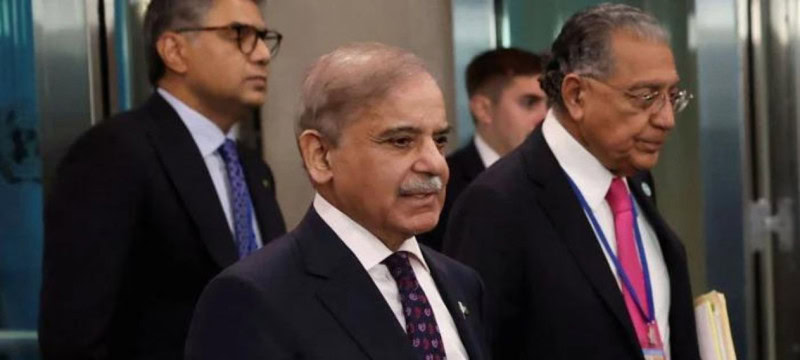Prime Minister Shehbaz Sharif announced that Pakistan has successfully fulfilled the strict conditions set by the International Monetary Fund (IMF). Speaking at a discussion on Sustainable Development Goals (SDGs) during his visit to the United States, he expressed gratitude to countries like China, Saudi Arabia, and the UAE for their crucial support in helping Pakistan navigate its challenges.
PM Shehbaz urged developed nations to assist developing countries like Pakistan in escaping debt traps intensified by climate change-related disasters. At the SDG Moment 2024 Meeting, he highlighted that while developing countries contribute minimally to global emissions, they bear the brunt of climate disasters.
Read more: PM Shehbaz Sharif Lands in New York for 79th UNGA Session
He noted the devastating floods in 2022 that caused $30 billion in damages, stressing that countries like Pakistan are forced to borrow to repay previous debts, creating a “death trap” cycle. He called for a more equitable system where developed countries, responsible for most global emissions, take accountability and provide meaningful assistance.
The prime minister also pointed out the massive financing gap for SDGs, which runs into trillions of dollars, leaving Pakistan struggling to secure funding for essential projects. He emphasized that achieving SDGs would remain a significant challenge without support from wealthier nations.
Additionally, PM Shehbaz addressed Pakistan’s ongoing fight against terrorism, stating that it remains one of the country’s greatest challenges since 9/11. He revealed that 80,000 Pakistanis have lost their lives to terrorism linked to cross-border influences, costing the country $150 billion during counter-terrorism operations. Despite these challenges, he assured that Pakistan has overcome the worst terrorist threats.
He highlighted his government’s focus on education reforms, including the Punjab Endowment Education Fund (PEEF), which provides scholarships to students from impoverished backgrounds, and the establishment of Danish Schools for talented orphans and underprivileged children. Despite these efforts, he lamented that around 25 million children are still out of school, a pressing challenge his government aims to address through reforms and enrollment drives.
Lastly, PM Shehbaz urged the international community to address not just the immediate financial needs of developing countries but also to take decisive action on climate change and support education and vocational training for long-term development.
Earlier this month, the IMF confirmed that its Executive Board would meet on September 25 to discuss approving Pakistan’s $7 billion Extended Fund Facility (EFF) loan, crucial for stabilizing the country’s economy amid rising inflation and dwindling reserves.
This loan package had been in discussion since May, with a staff-level agreement reached in July, but faced delays in finalizing IMF Board approval. Pakistan had to meet stringent conditions, including imposing record new taxes and significant electricity price hikes.
Among other stipulations, the country agreed to halt the establishment of new special economic or export processing zones and not extend tax incentives for existing ones. These measures have raised concerns about the transfer of key economic decision-making to the IMF.
State Bank of Pakistan Governor Jameel Ahmad confirmed that Pakistan arranged over $2 billion in external financing from non-IMF lenders, indicating no further hurdles in presenting its case to the board. PM Shehbaz, addressing the federal cabinet, praised the progress in negotiations with the IMF and expressed hope for a positive outcome while acknowledging the harshness of the measures imposed. He reiterated the importance of freeing Pakistan from reliance on external loans and building a self-sustaining economy.









